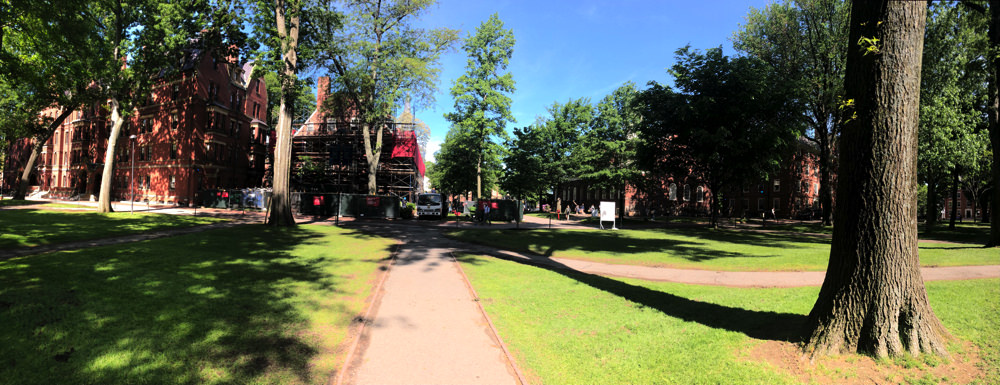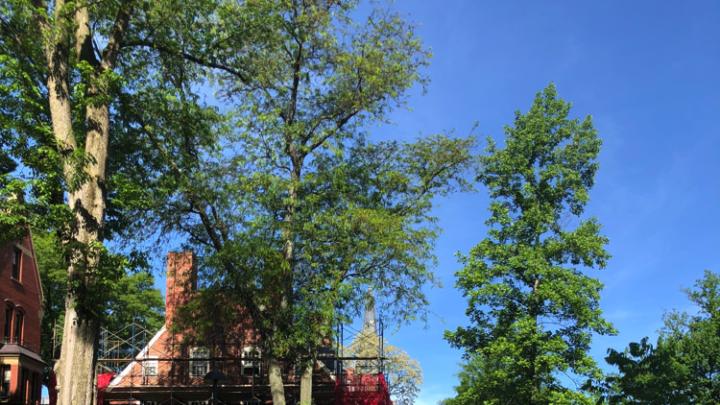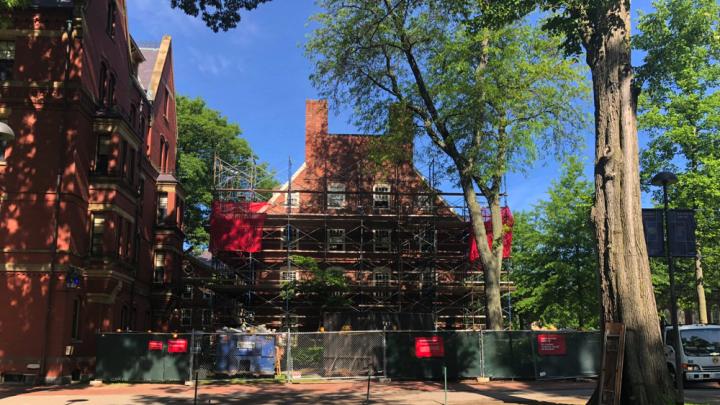The construction scaffolding that has grown like aggressive ivy around campus buildings in recent years now enshrouds Massachusetts Hall, Harvard’s longest-surviving building and the second-oldest academic building in the nation, as the site undergoes renovations this summer.
Home to the office of the president (and, upstairs, 14 College freshmen), Massachusetts Hall is in the midst of an exterior facelift that will restore the site’s Georgian architectural façade, and extensive internal renovations that will replace heating and cooling systems and install “significant code and life safety upgrades”—including an elevator that will bring the building into compliance with the Americans with Disabilities Act requirements for accessibility—according to the University’s application for approval of the construction. The clock face fronting on Massachusetts Avenue has been removed for restoration.
“The upkeep of a building like Massachusetts Hall requires significant attention to historical preservation in addition to the typical maintenance work,” executive vice president Katie Lapp said in a statement. “These long-overdue renovations will also ensure that the building is contributing to University goals to reduce on-campus greenhouse-gas emissions, while making it as accessible as possible to all members of the community.”
University president Drew Faust will spend the last few weeks of her tenure working in Wadsworth House, Harvard spokesperson Brigid O’Rourke wrote in an email. Lawrence S. Bacow, Faust’s successor, will be based in Loeb House until the renovations are completed. (It is a familiar venue, since it is the site of Corporation meetings and Bacow has been a member of the governing board since 2011.) No fixed date has been set for completion, but the building will be ready in time for freshmen to move in on schedule.

Photograph by Lydia Carmichael/Harvard Magazine
Massachusetts Hall was registered in 1977 as a National Historic Landmark by the National Park Service—a designation that requires any renovation plans to be approved by the Cambridge Historical Commission. The commission agreed to Harvard’s plans in January, requiring that “masonry and construction details be reviewed with and approved by” the commission’s staff.
“It is the oldest surviving building of the first colonial institution for higher learning,” the University wrote in its application for Historic Landmark status in the 1970s. “As such, it possesses great significance, not only in the history of American education but in the story of the development of England’s North American colonies during the 18th century.”
The renovations will be demanding: to sustain Massachusetts Hall’s historical integrity, the University must ensure the renovations adhere as closely as possible to the materials used to erect the building in the eighteenth century. “Sourcing bricks in the cut, color, and size popular in 1720, matching the exact color and consistency of 300-year-old mortar, and re-creating the wooden gutters are among the challenges facing the renovation teams,” according to a University statement.
Originally built as a dormitory—it was the undergraduate home of the nation’s second president, John Adams, A.B. 1755, LL.D. 1781, who resided in a triple on the first floor—Massachusetts Hall served as army barracks for the Continental Army during the American Revolutionary War. It was reconfigured in 1870 for lecture-hall use. A little more than a half-century later, a fire ravaged the two top floors of the building and charred its exterior, leading to another round of renovations that converted the building back to a dormitory in 1924. Administrative offices were added in 1939.








